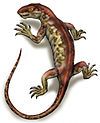Otsheria
| Otsheria Temporal range: Middle Permian,
| |
|---|---|

| |
| Life restoration of Otsheria | |
| Scientific classification | |
| Domain: | Eukaryota |
| Kingdom: | Animalia |
| Phylum: | Chordata |
| Clade: | Synapsida |
| Clade: | Therapsida |
| Suborder: | †Anomodontia |
| Genus: | †Otsheria Tchudinov, 1960 |
| Species: | †O. netzvetajevi
|
| Binomial name | |
| †Otsheria netzvetajevi Tchudinov, 1960
| |
Otsheria is an extinct genus of anomodont, in the infraorder venyukovioidea. It lived in modern-day Russia during the Permian.[1]
The genus is named for the Ochyor region where it was discovered in 1960, and the type species is Otsheria netzvetajevi.[2]
The holotype, a skull lacking a mandible (PIN 1758/5), is the only Otsheria fossil extant. The skull is 10.5 centimetres (4.1 in) in length, with large eye sockets and a short, broad snout. The skull suggests four incisors and nine short, flattened maxillary teeth. The canines are undifferentiated. The shape of the teeth and skull both suggest a mouth adapted for cutting plant parts, which in turn suggests a herbivorous or omnivorous diet.[3]

See also
[edit]References
[edit]- ^ Modesto, S. P. & Rybcynski, N. The amniote faunas of the Russian Permian: implications for Late Permian terrestrial vertebrate biogeography. In Benton, M. J.; Shishkin, M. A.; Unwin, D. M.; Kurochkin, E. N. The Age of Dinosaurs in Russia and Mongolia. Cambridge University Press, 2001. 672 p.
- ^ Ivakhnenko, M.F. (2003). "Eotherapsids from the East European Placket (Late Permian)". Paleontological Journal. 37 (S4): 339–465. Retrieved 6 March 2023.
- ^ Kemp, T. S. (2005). The Origin and Evolution of Mammals. Oxford University Press. pp. 39–42. ISBN 978-0-19-850761-1.
Further reading
[edit]- The Origin and Evolution of Mammals (Oxford Biology) by T. S. Kemp
- The Age of Dinosaurs in Russia and Mongolia by Michael J. Benton, Mikhail A. Shishkin, David M. Unwin, and Evgenii N. Kurochkin
- Origins of the Higher Groups of Tetrapods: Controversy and Consensus by Hans-Peter Schultze and Linda Trueb
- Reptiles and Herbivory by G.M. King






